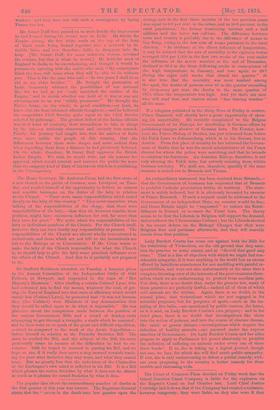Mr. Grant Duff then passed on to state briefly the
impressions he had formed during his recent tour in India. He thinks the Empire strong, the few white seeds on the top of the heap of black seeds being bound together into a network by in- visible links, and not, therefore, liable to disappear into the heap. [Mr. Grant Duff, for some unknown reason, reversed the colours, but that is what he meant.] He held the need of England to India to be overwhelming, and thought it would be permanent, agreeing with the native who said, "My countrymen think the time will come when they will be able to do without you. That is like the man who said,—' In two years I shall be as old as my elder brother.' " He thought the possession of India immensely widened the possibilities of our national life, for we had as yet " only scratched the surface of the Empire," and to decide whether our hold of it was or was not advantageous to us was "wildly premature." He thought the Native Army, on the whole, in good condition,—at least, he knew that the best-informed officials thought so,—and he believed the competitive Civil Service quite equal to the Civil Service selected by patronage. The greatest defect of the Indian officials was their want of curiosity, their unreadiness to take in things by the eye,—a curiously observant and entirely true remark. Finally, his journey had taught him that the natives of India were more unlike the people of this country, that the
differences between them were deeper and more radical than when regarding them from a distance he had previously believed.
On the whole, therefore, M. Grant Duff approves the British Indian Empire. We wish he would write out his reasons for approval, which would interest and instruct the public far more than the snippety kind of diary of his travels which he is publishing in the Contemporary.


































 Previous page
Previous page